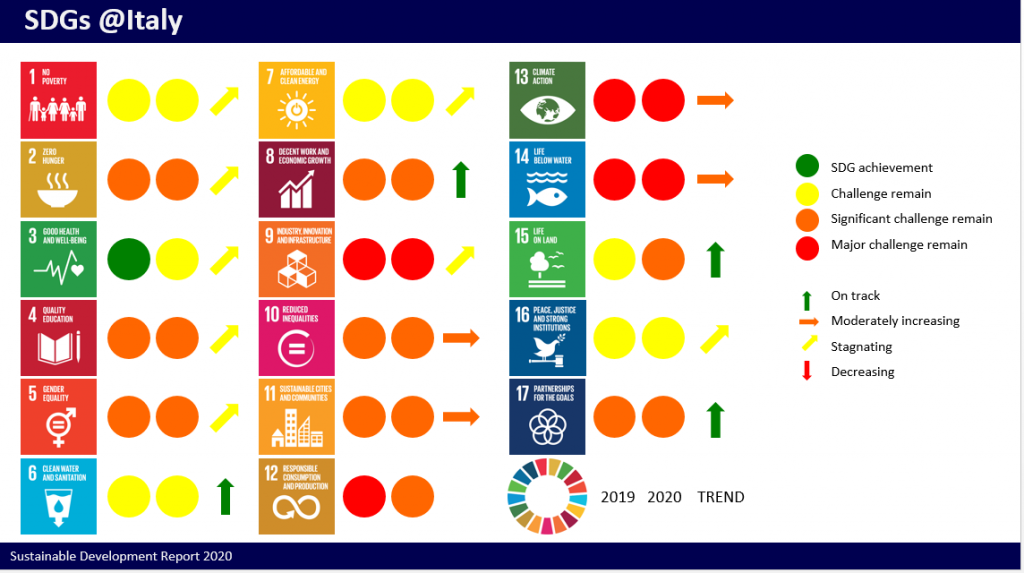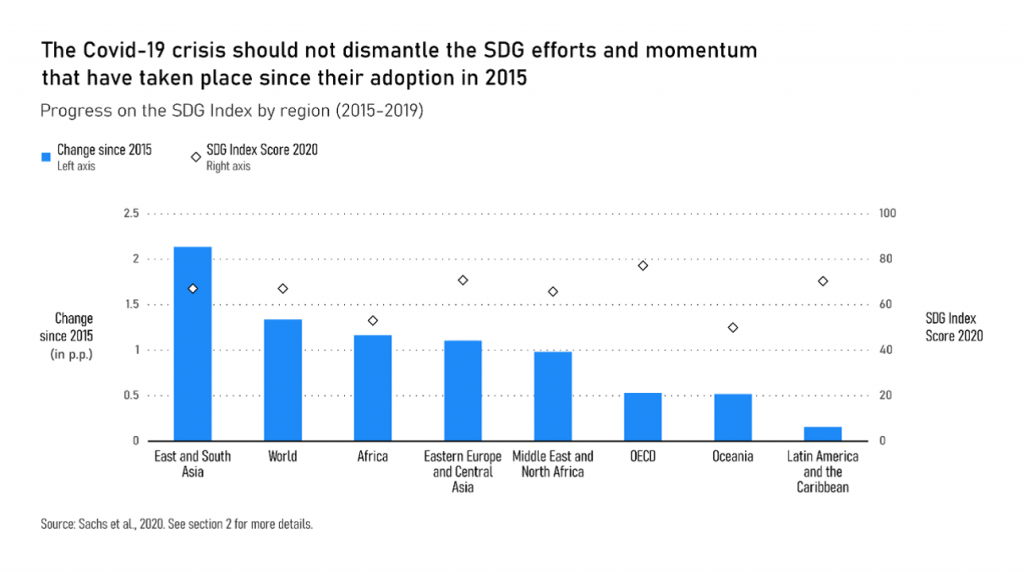Press Release
2020 Sustainable Development Report
Sustainable Development Goals: necessary for the world post COVID-19 recovery
From the 2020 Report, Italy confirms its 30th position in the world ranking for achieving the SDGs
- Released the last 2020 edition of the 2020 Sustainable Development Report (SDR) of the UN Sustainable Development Solutions Network (SDSN) led by Jeffrey Sachs. The Report tracks progress by countries towards the SDGs and underlines the need to increase efforts in their realization and to tackle the effects of the COVID-19 pandemic on each Goal
- The 17 SDGs and the Transformations necessary for their implementation should guide the recovery from COVID-19
- Partnership and international cooperation (SDG17) can speed a favorable and rapid resolution to the epidemic
6 July 2020 – On June 30, 2020, the 2020 Sustainable Development Report (SDR), including the SDG Index and Dashboards, was released. It was written by lead author Jeffrey Sachs and a team of independent experts working at the Sustainable Development Solutions Network (SDSN) and Bertelsmann Stiftung, and published by Cambridge University Press.
The report outlines the likely short-term impacts of Covid-19 on the Sustainable Development Goals (SDGs) and describes how the SDGs can frame the recovery. Since its launch in 2016, this annual report has provided the most up-to-date data to track and rank the performance of all UN member states on the SDGs. As an unofficial monitoring tool, the SDR is complementary to official efforts to monitor the SDGs.
The report analyses how governments have responded to the immediate health crisis and describes emerging lessons for public health authorities, governments at large, and the public. The crisis has shown profound weaknesses in public health systems, including in many of the richest countries that were deemed to be well prepared for such a pandemic. Meanwhile, some countries, particularly in the Asia-Pacific region, have (so far) been successful in containing Covid-19 and minimizing the damage to their economies. The report presents a novel approach and pilot Index for the effectiveness of countries early response to Covid-19 in 33 OECD countries, which integrates health and economic considerations.
Overall, South Korea tops this new Index followed by Baltic countries and countries from the Asia Pacific region. By contrast, Western European countries and the United States were less successful in mitigating health and economic impacts from Covid-19.
The report finds that between 2015 and 2019, the global community made significant progress on the SDGs. Progress varies across SDGs, regions, and countries. As in previous years, the SDG Index is topped by three Nordic countries – Sweden, Denmark and Finland. Yet, even these countries face significant challenges in achieving at least one of the goals. No country is on track for achieving all SDGs. Covid-19 is likely to have severe short-term negative impacts on most SDGs. In particular on SDG 1 (No Poverty), SDG 2 (No Hunger), SDG 3 (Good Health and Well-Being) and SDG 8 (Decent Work and Economic Growth). Covid-19 gravely amplifies income inequalities and other forms of inequalities. The bright spots in a foreboding picture are the reduced environmental impacts as a result of the decline in economic activity. A key objective is to restore economic activity without simply restoring the old patterns of environmental degradation.
Italy confirms last year’s position, ranking 30th in the 2020 SDG Index, behind other OECD countries, other than the Nordic ones, France, Germany and Spain. Therefore, the situation in our country does not show significant changes compared to last year, with a substantial positive trend towards the achievement of the SDGs. Some improvements compared to the previous year are recorded with regard to responsible consumption and production trends related to Goal 12 (“Responsible consumption and production”), while Goal 3 (“Good Health and Well-Being”) indicates a worsening of health and well-being conditions. Regarding Goal 15 (“Life on land”), although the performance is lower than last year, there is a positive trend in relation to the protection of the ecosystem and greater attention towards the protection of biodiversity.
Critical situations in which the greatest delays persist occur for Goal 9 (“Industry, innovation and infrastructure) indicating a still inadequate level of investments and actions to promote industrial innovations and infrastructures, for Goal 14 (“Life on land”) which shows the progressive loss of biodiversity with reference to marine waters (poor water quality, unsustainable fishing practices, illegal fishing), for Goal 13 (“Climate change”) where the greatest challenges related to actions to mitigate climate change still persist. With regard to Goal 1 (No poverty) and Goal 2 (Zero Hunger), Italy does not show substantial changes compared to 2018, confirming a negative picture that sees an increase in the population at risk of poverty as well as an increase in obesity and unhealthy food habits in contrast to the Mediterranean diet’s principles.
At the international level, the SDGs and the Six SDG Transformations – which are: (1) education, gender and inequality; (2) health, well-being and demography; (3) energy decarbonization and sustainable industry; (4) sustainable food, land, water and oceans; (5) sustainable cities and communities; and (6) digital revolution for sustainable development – should guide the recovery from Covid-19. No country will be safe from the pandemic unless all countries bring the virus under control. The report presents a detailed framework for how countries can build back better using the SDGs.
The current crisis, including hostilities among major powers, raises the specter of global conflict instead of global cooperation. The good news is that most of the world urgently wants multilateralism and cooperation. The bad news is that some countries do not, while others are paralyzed by their own crises, budget deficits, and divisions of local politics. The multilateral situation is therefore fraught and needs bolstering.
International cooperation, covered under SDG 17 (Partnerships for the Goals), can speed a favorable and rapid resolution to the epidemic. Indeed, there is no other way to succeed.
The report identifies five key measures that global cooperation should include:
(1) Disseminate best practices rapidly.
(2) Strengthen financing mechanisms for developing countries.
(3) Address hunger hotspots.
(4) Ensure social protection.
(5) Promote new drugs and vaccines.
Angelo Riccaboni, Chair of the Mediterranean Sustainable Development Solutions Network (SDSN Med) and President of the Santa Chiara Lab of the University of Siena: “Annual monitoring is essential to define transformation strategies useful for implementing the 2030 Agenda. As SDSN Med we are developing the 2020 edition of the progress report towards the Sustainable Development Goals in the Mediterranean. In particular, SDSN Med is supporting transformation processes based on technological, social and organizational innovation thanks to partnerships between research centers in various countries. Only with innovation, in fact, will we be able to respond to the challenges we face for a prosperous future for the Mediterranean”.
Sabina Ratti, Chair of the Italian Sustainable Development Solutions Network (SDSN Italy) and Senior Advisor in ASviS (Italian Alliance for Sustainable Development): “Even in our country, the 2030 Agenda indicates the direction to respond effectively to the crisis caused by the pandemic and to stimulate the transformative resilience of the socio-economic system, having as reference its principles of equity, inclusion, respect for ecosystems and global collaboration. It will be essential to bring the analysis, starting from the international view of the SDSN Report, to communities, cities, regions to take into account the specific territorial features and to activate the collaboration of all institutional, academic, social and economic actors”.
UN SDSN Mediterranean is the regional hub of the Sustainable Development Solutions Network (SDSN) for the Mediterranean area, hosted by the Santa Chiara Lab of the University of Siena. UN SDSN Italia is the national network of SDSN, hosted by the Eni Enrico Mattei Foundation and the Santa Chiara Lab of the University of Siena.
The main objective of both networks is to increase the knowledge and awareness of the 2030 Agenda, promoting the interaction between academic institutions, companies, research centers, organizations, and associations to disseminate knowledge and innovation within the 17 Development Goals Sustainable. The networks, in close collaboration with each other and with other institutions including the Italian Alliance for Sustainable Development (ASviS), operate mainly in the area of education, innovation and training with the aim of developing professional skills in the sustainability sector.
Further Information:
- Sachs, J., Schmidt-Traub, G., Kroll, C., Lafortune, G., Fuller, G., Woelm, F. (2020): The Sustainable Development Goals and COVID-19. Sustainable Development Report 2020. Cambridge University Press.
- It is possible to download the Report here: https://www.sdgindex.org/
- Global Index Score 2019: https://dashboards.sdgindex.org/#/
- “Six Transformations to achieve the Sustainable Development Goals”: https://go.nature.com/2ZFUEih
Contacts:
Barbara Di Paola | + 39 392 9952426 | barbara.dipaola2@unisi.it



